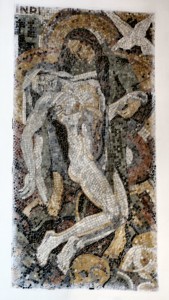Does Legalizing “Same-Sex Marriage” also Legalize the “Three Parent Family”?
A blog I wrote on “same-sex marriage” was included in the Roundup on May 13. This post is on the same topic. The outcome of the pending court decision can profoundly change our Catholic freedom as we know it. The potential consequences for our children and their children could include the eradication of the traditional family.
The Republic of Ireland, once a bastion of Catholicism, now has embraced the distinction of being the first country in the world to approve a constitutional amendment endorsing “same-sex marriage.” I wrap the phrase in quotation marks because this whole concept is still an illusion. No matter how you spin, present, defend, and embrace the doctrine of “same-sex marriage” there is always going to be this tiny little problem called procreation. That is simply because within a “same-sex marriage,” procreation can never happen without the involvement of a third person, that person being of the opposite sex. “Same-sex marriage” spawns the “three-parent family.”
Already the Irish Prime Minister, Enda Kenny, has said that Catholic schools will be required to teach “same-sex marriage” as part of the curriculum. How can they do that? That violates Church teaching. Have we arrived at an international secular tipping point where Church teachings are subject to the whims and mores of the present culture? Apparently we have. What about the children?
Even the Catholic Archbishop of Dublin, Diarmuld Martin, simply voted “no” because of his OWN belief and did not defend the church he represents. The Archbishop, referring to a time when the Church hierarchy would instruct Catholics on how they should vote said that “those days are gone.” How courageously pathetic is that? Have any of you heard anything from our Catholic pulpits about this? I am stunned at the number of Catholics I talk to who do not seem to have a clue as to what is going on regarding this subject. And what about the children?
The Supreme Court of the United States of America will pronounce its ruling on the constitutionality of “same-sex marriage” toward the end of June. I believe that the decision has already been reached and is in the can, ready to be read. I also believe that the Court will go 5 to 4 in favor of “same-sex marriage.” I hope I am wrong because the ramifications of such a decision will be (in my opinion) catastrophic for the nation and especially for our future children.
This new law in Ireland confers an automatic right on a “same-sex couple” to procreate. Will that be the same in America? Good luck with that one. It cannot be done. You need a person of the OPPOSITE SEX to procreate. So are we now to have a whole new industry arise whose purpose will be to provide wombs and sperm, depending on the “same-sex” genders of the wannabe parents? And what about the children? How many future children will be born into “three-parent families”?
Will the Catholic/Christian schools be required to teach the secular dogma of this law? If they do not abide by this law, will they have to forfeit any tax credits or exemptions, i.e. their 501(c)3s? Will hefty fines be imposed? Can they be closed down by federal mandate? Will Catholic hospitals be told to violate their faith-bound principles? If they refuse to do so, will they then be forced to close because of the sudden absence of Medicare and Medicaid funds? What about the children? How do they find out about any possible genetic anomalies they might have? The mysteriously-absent-yet-genetically-related “third parent” will be nowhere to be found.
Bottom line–this is a disaster. No one is trying to deprive “same-sex couples” of any civil or legal rights. What we are watching here is the attempted destruction of the First Amendment to the Constitution followed by the destruction of the traditional family. Once the law of the land can tell the religions of the land what their believers must think and do, it is the end of our Republic as we know it. And when the children of these “three-parent families” grow up and want to find out who their REAL moms or dads were, how does that work? Do you call Ancestry.com?
We all had better be praying very hard over the next few weeks. Much is at stake.








